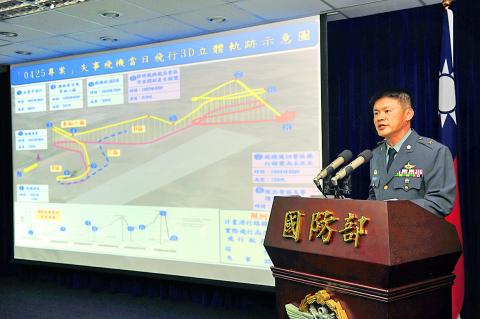The timetable for the nation’s AH-64E Apache attack helicopters to become fully operational has not been affected by a chopper crash in northern Taiwan in April, an army official said yesterday.
“The Apaches will become operational in 2017” as scheduled, Major General Chen Chien-tsai (陳健財), deputy commander of the Republic of China Army Aviation Special Forces Command, said at a news conference to present the conclusions of the army’s investigation into the accident.
The chopper, one of 18 that have been delivered to Taiwan by the US since November last year, was on a training mission on April 25 when it crashed into the top of a three-story residential building in Taoyuan County’s Longtan Township (龍潭), damaging four homes, but causing no serious injuries.

Photo: Lo Pei-der, Taipei Times
Asked whether the incident had affected the delivery schedule of the other 12 Apaches to Taiwan, Chen said it had not.
The fourth batch of Apache helicopters is set to arrive in August, while the final batch is expected to be delivered in October, he said.
They are part of a NT$59.31 billion (US$2.01 billion) order for 30 of the latest Apache model.
The army said environmental factors and human error were found to be the main causes of the helicopter crash and that mechanical failure had been ruled out.
The aircraft was enveloped in cloud during a training mission at an altitude of 120 feet (36.6m) as the cloud ceiling dropped suddenly to below 200 feet, said Major General Huang Kuo-ming (黃國明), deputy inspector-general of the army.
This affected visibility and led to spatial disorientation of the pilot, Major Chen Lung-chien (陳龍謙), a flight instructor who was flying the helicopter at the time, Huang said.
However, he said Chen should have relied on his flight instruments to keep track of the aircraft’s altitude and direction.
Spatial disorientation refers to the inability of a person to determine his true body position, motion and altitude relative to the ground or his surroundings.
Chen and the other pilot on the ill-fated Apache, Lieutenant Colonel Liu Ming-hui (劉銘輝), have been suspended since the incident and have also been receiving counseling to help them recover from the incident, the army said.
They will be able to fly again after a series of evaluations, a process that could take up to six months, Chen said.
On the question of seeking compensation from the US since the Apache helicopter was still under its 18-month warranty, Huang said the ministry was studying that possibility.
Speaking on condition of anonymity, an army official said that although mechanical failure has been ruled out, the US may be seen as responsible for not training Taiwanese pilots properly on how to deal with sudden climate changes, like those that occurred on the day of the crash.
The US and Taiwan are the only two countries that use AH-64E Apache helicopters.

AGING: As of last month, people aged 65 or older accounted for 20.06 percent of the total population and the number of couples who got married fell by 18,685 from 2024 Taiwan has surpassed South Korea as the country least willing to have children, with an annual crude birthrate of 4.62 per 1,000 people, Ministry of the Interior data showed yesterday. The nation was previously ranked the second-lowest country in terms of total fertility rate, or the average number of children a woman has in her lifetime. However, South Korea’s fertility rate began to recover from 2023, with total fertility rate rising from 0.72 and estimated to reach 0.82 to 0.85 by last year, and the crude birthrate projected at 6.7 per 1,000 people. Japan’s crude birthrate was projected to fall below six,

Conflict with Taiwan could leave China with “massive economic disruption, catastrophic military losses, significant social unrest, and devastating sanctions,” a US think tank said in a report released on Monday. The German Marshall Fund released a report titled If China Attacks Taiwan: The Consequences for China of “Minor Conflict” and “Major War” Scenarios. The report details the “massive” economic, military, social and international costs to China in the event of a minor conflict or major war with Taiwan, estimating that the Chinese People’s Liberation Army (PLA) could sustain losses of more than half of its active-duty ground forces, including 100,000 troops. Understanding Chinese

US President Donald Trump in an interview with the New York Times published on Thursday said that “it’s up to” Chinese President Xi Jinping (習近平) what China does on Taiwan, but that he would be “very unhappy” with a change in the “status quo.” “He [Xi] considers it to be a part of China, and that’s up to him what he’s going to be doing, but I’ve expressed to him that I would be very unhappy if he did that, and I don’t think he’ll do that. I hope he doesn’t do that,” Trump said. Trump made the comments in the context

SELF-DEFENSE: Tokyo has accelerated its spending goal and its defense minister said the nation needs to discuss whether it should develop nuclear-powered submarines China is ramping up objections to what it sees as Japan’s desire to acquire nuclear weapons, despite Tokyo’s longstanding renunciation of such arms, deepening another fissure in the two neighbors’ increasingly tense ties. In what appears to be a concerted effort, China’s foreign and defense ministries issued statements on Thursday condemning alleged remilitarism efforts by Tokyo. The remarks came as two of the country’s top think tanks jointly issued a 29-page report framing actions by “right-wing forces” in Japan as posing a “serious threat” to world peace. While that report did not define “right-wing forces,” the Chinese Ministry of Foreign Affairs was